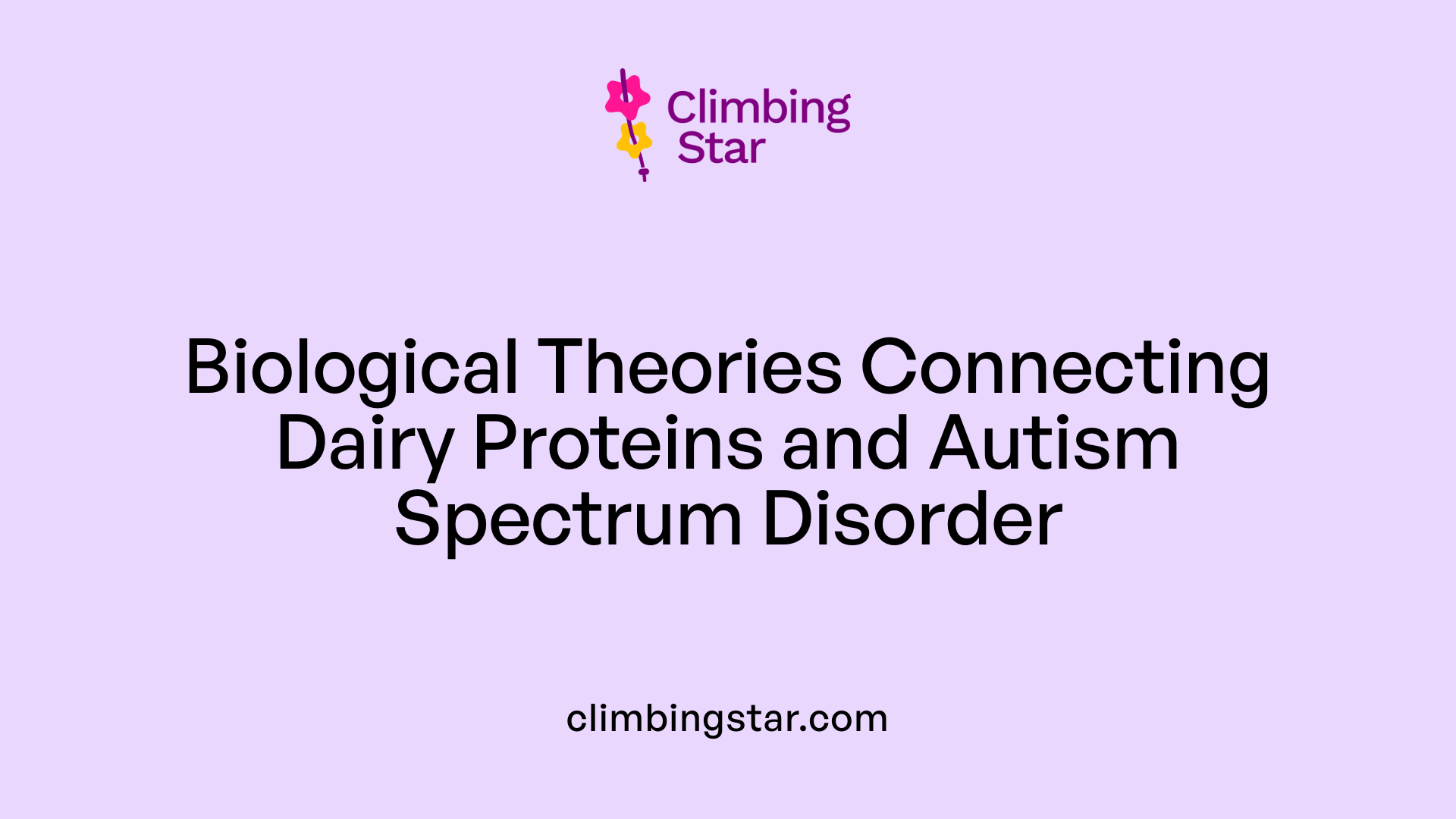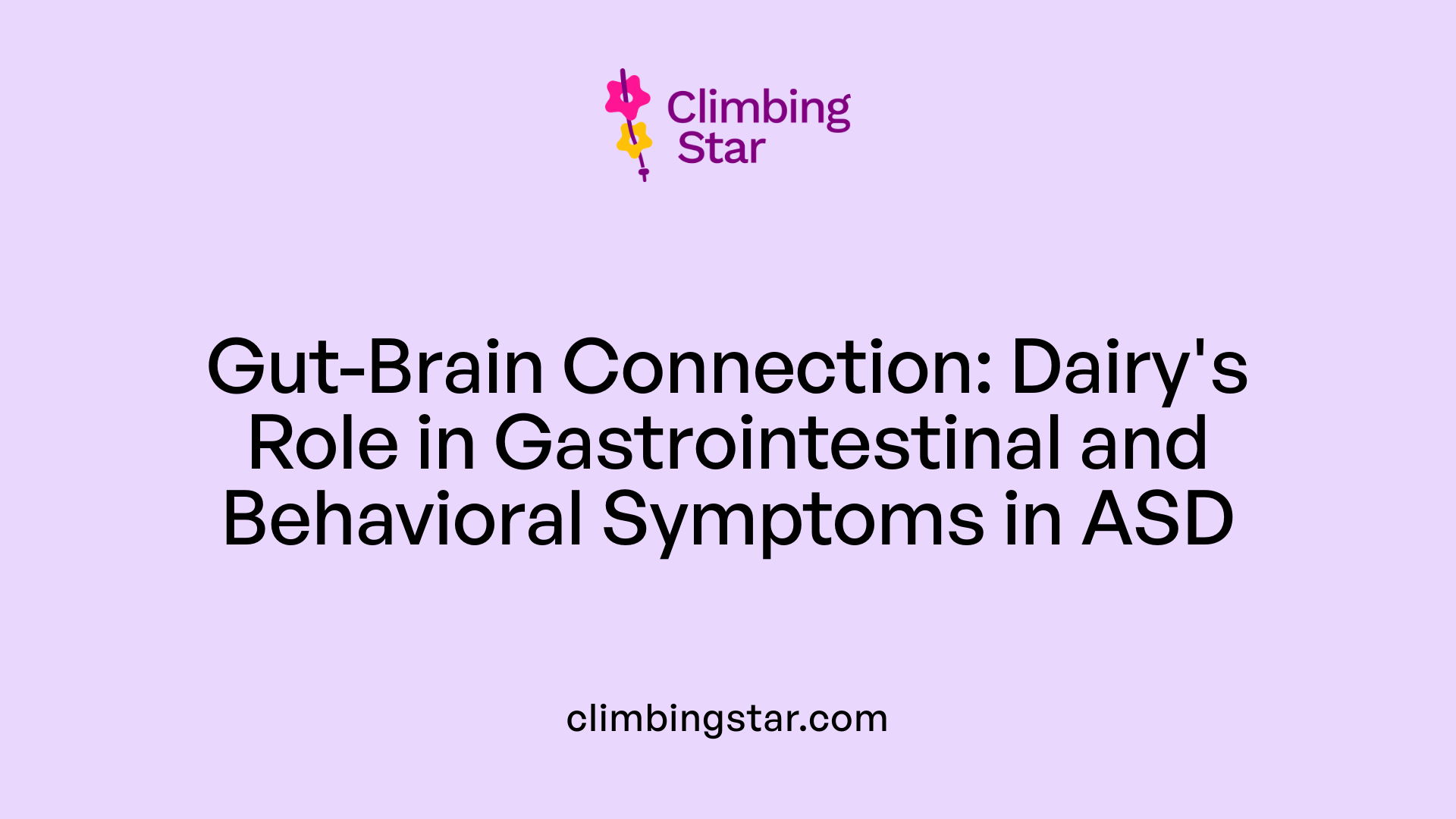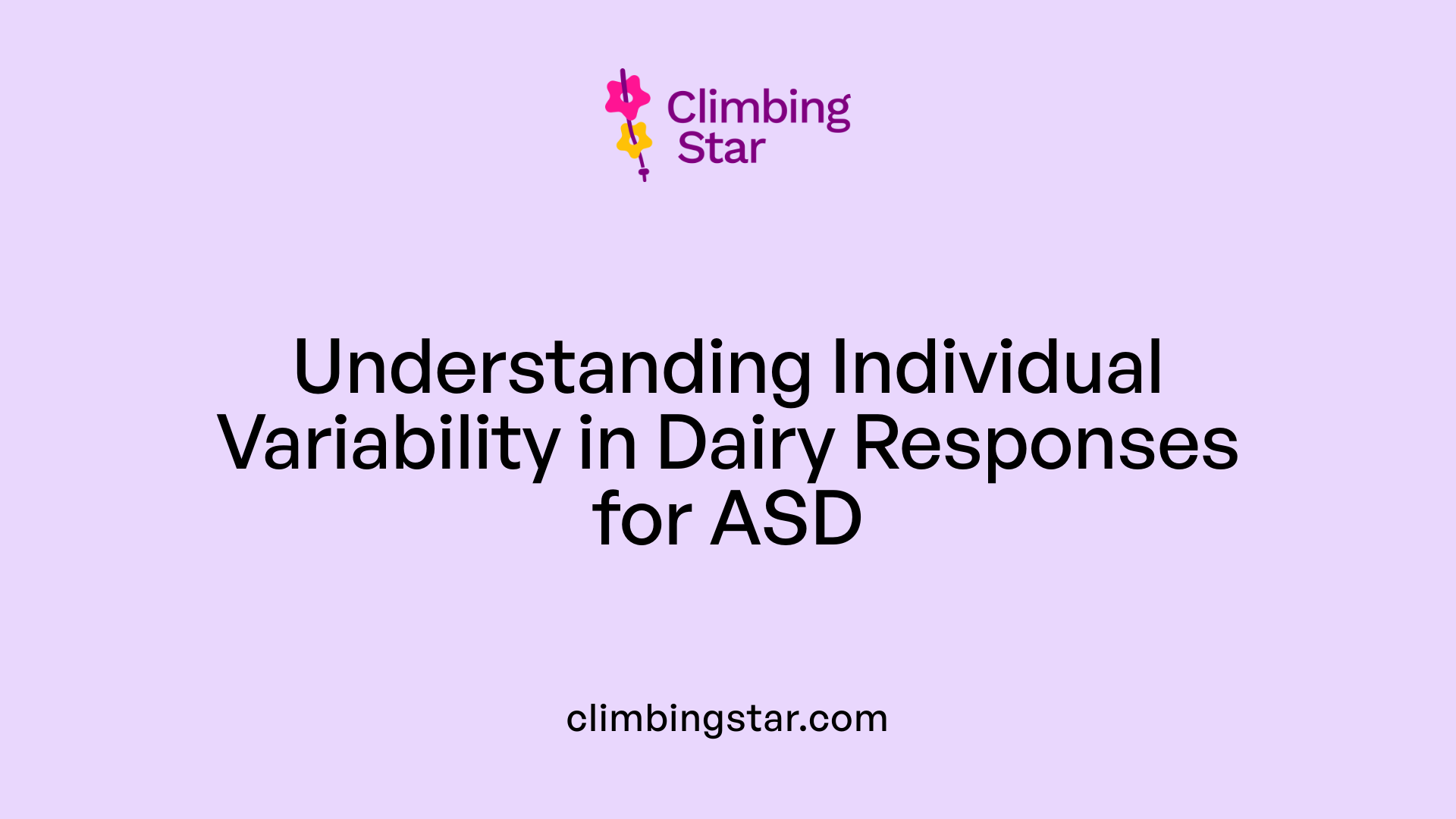Understanding the Potential Linkages and Impact of Dairy on ASD
The relationship between dairy consumption and autism spectrum disorder (ASD) is a subject of ongoing investigation, with many families and clinicians exploring dietary interventions aimed at managing ASD symptoms. This article delves into current scientific theories, research findings, and practical dietary strategies related to dairy intake and autism, emphasizing the variability in individual responses and the importance of evidence-based approaches.
Dairy Consumption Patterns in Children with ASD
What is the relationship between dairy consumption and autism spectrum disorder (ASD) symptoms?
Research shows that children with ASD tend to consume less milk compared to typically developing (TD) children, and this difference is statistically significant (p < 0.05). Moreover, studies have found that higher intake of sugar-sweetened beverages is associated with increased emotional problems in children with ASD, while lower milk consumption correlates with reduced prosocial behaviors. These patterns suggest that dietary choices may influence behavioral and emotional aspects of ASD.
Many children with ASD also experience gastrointestinal issues such as constipation, diarrhea, and abdominal pain, which are linked to imbalances in gut microbiota. Because dairy products can sometimes exacerbate gastrointestinal symptoms, some parents and clinicians explore dairy elimination as part of management strategies.
The theory behind dairy restrictions derives partly from the opioid model, where peptides from casein (a milk protein) may impact brain function if they cross the gut and blood-brain barriers—potentially affecting autism symptoms. Consequently, diets excluding dairy and gluten, known as gluten-free casein-free (GFCF) diets, are popular among some families.
However, scientific evidence supporting the effectiveness of dairy elimination for improving ASD symptoms remains mixed. While some reports suggest reductions in gastrointestinal discomfort and behavioral issues, many studies have methodological limitations, and definitive conclusions are lacking.
It is crucial to note that children with ASD are often at risk for nutritional deficiencies, such as calcium, which is essential for bone health. Most milk alternatives are fortified with calcium, and many other foods naturally contain it, helping to mitigate potential deficiencies from dairy restriction.
In summary, although some children with ASD might benefit from tailored dietary adjustments, routine dairy elimination should be approached cautiously. Ensuring adequate nutritional intake and consulting health professionals are vital steps when considering dietary changes.
| Aspect | Observations | Additional Details |
|---|---|---|
| Dairy intake levels | Children with ASD drink less milk | p < 0.05; inverse correlation with prosocial skills |
| Gastrointestinal symptoms | High prevalence, from 23% to 70% | Often related to gut microbiota imbalance |
| Behavioral impacts | Some improvement with dairy elimination | Evidence is inconclusive; varies among individuals |
| Nutritional considerations | Risk of calcium deficiency | Fortified alternatives and dietary sources available |
| Research status | Inconclusive and mixed | Ongoing studies examine specific milk types like A2 milk |
Understanding current patterns in dairy consumption and their potential impact can inform more personalized approaches to ASD management. Dietary modifications, including dairy considerations, should always be made under medical supervision to ensure overall health and nutritional adequacy.
Theories and Biological Mechanisms Linking Dairy and ASD

What are the scientific theories and research exploring the connection between dairy and ASD?
Research into how dairy might affect autism spectrum disorder (ASD) is ongoing and features a mix of hypotheses and preliminary findings. One prominent theory involves the proteins found in milk, especially casein, which can break down into smaller peptides called casomorphins. These peptides are believed to have opioid-like effects, potentially influencing brain function and behavior.
Some scientists suggest that in certain individuals with ASD, peptides such as casomorphins could cross the gut lining—especially if a condition called leaky gut syndrome is present—and enter the bloodstream. From there, they might bypass the blood-brain barrier and interact with opioid receptors in the brain, possibly affecting mood, cognition, and social behaviors.
A specific focus is on a milk protein called A1 beta-casein. When digested, A1 beta-casein produces a breakdown product known as beta-casomorphin 1-7 (BC 1-7). Preliminary research indicates that this peptide may influence neurological pathways, potentially aggravating or contributing to some ASD symptoms. Some studies are investigating whether isolates like A1 beta-casein free milk could minimize these effects.
Gastrointestinal problems common in children with ASD, such as constipation and stomach pain, also factor into these theories. Inflammation and imbalance of gut microbiota may impair the intestinal barrier, making it easier for peptides to enter the bloodstream and possibly reach the brain.
Although current scientific evidence remains inconclusive, these theories support the idea that dairy elimination might benefit certain individuals with ASD—particularly those with gastrointestinal issues or sensitivities—to reduce inflammation and improve behavioral outcomes.
| Aspect | Explanation | Related Research |
|---|---|---|
| Opioid effects | Peptides like casomorphins from dairy may mimic opioids, affecting brain function | Studies on casomorphins and ASD behaviors |
| A1 beta-casein | Produces BC 1-7, which might influence neurochemical pathways | Trials on A1 beta-casein free milk |
| Leaky gut | Increased intestinal permeability may allow peptides to reach the brain | Studies on gut microbiota and ASD |
Overall, while these biological mechanisms are compelling and ongoing research is promising, definitive evidence linking dairy proteins to ASD symptoms requires further investigation.
Gastrointestinal and Mental Health Connection in ASD and Dairy

What research has been conducted on the effects of dairy in relation to gastrointestinal health and overall symptom management in autism?
Research exploring the impact of dairy on gastrointestinal (GI) health and autism symptoms reveals that eliminating dairy can lead to improvements in GI issues common among children with ASD. These symptoms often include constipation, diarrhea, abdominal pain, gastroesophageal reflux, and inflammatory bowel conditions. The prevalence of GI disturbances in children with autism ranges from 23% to 70%, and many of these individuals exhibit gut microbiota imbalances.
The theory behind mostly dietary interventions focuses on the role of incompletely digested dairy proteins, especially casein, which breaks down into peptides called casomorphins. These peptides are thought to have opioid-like effects, potentially crossing the gut barrier and influencing brain chemistry, which may worsen behavioral symptoms. By removing dairy products, including milk, cheese, and yogurt, studies have observed reductions in GI discomfort and related behavioral issues in some children.
A typical approach involves a trial period of 4-6 weeks, during which parents and clinicians monitor changes in symptoms. Some reports suggest that dairy elimination can reduce inflammation by decreasing the formation of these bioactive peptides, thus potentially alleviating gut and neurological symptoms. Improvements observed include fewer gastrointestinal complaints, better mood, and increased social engagement.
While the evidence varies across different studies, many clinicians see dietary modification—particularly the removal of dairy and gluten—as a promising strategy to support children with ASD. These adjustments aim to promote gut health and, by extension, enhance overall behavior and cognition.
Despite these encouraging signs, it’s important to note that further research is required to establish definitive links and optimal protocols. As such, dietary changes should be undertaken under professional guidance, considering the risk of nutrient deficiencies, especially calcium and vitamin B12, which are abundant in dairy products. Alternative sources, including fortified milk substitutes and calcium-rich foods, are recommended to maintain nutritional balance.
In summary, eliminating dairy appears to offer benefits for some children with autism, particularly concerning gastrointestinal issues and possibly behavioral symptoms. Ongoing studies continue to investigate the mechanisms involved and whether such dietary adjustments should become standard practice in managing ASD.
For those interested in more in-depth information, searching for "Dairy and gastrointestinal health in ASD" can provide further insights into current research findings and clinical experiences.
Dietary Interventions and Elimination Diets in ASD Management

Are there dietary recommendations involving dairy elimination or modification for managing autism symptoms?
Many families and clinicians explore dietary approaches like eliminating or reducing dairy as a way to manage autism symptoms. One common plan is the gluten-free casein-free (GFCF) diet, which removes both gluten and casein— a protein found in milk.
Supporters believe that substances derived from these proteins might affect brain function and behavior through opioid-like effects. They propose that peptides from gluten and casein can cross the gut barrier, especially if someone has 'leaky gut syndrome,' and reach the brain, potentially influencing symptoms such as irritability, hyperactivity, and social difficulties.
Research into these diets shows mixed results. Some studies suggest that removing dairy and gluten can help reduce gastrointestinal problems and behavioral issues. However, the scientific evidence is inconsistent and often limited by small sample sizes or methodological flaws.
The mechanisms behind these diets involve complex interactions among immune responses, gut permeability, and the microbiome (the collection of microorganisms in the gut). For example, individuals with ASD frequently experience gastrointestinal symptoms like constipation, diarrhea, and abdominal pain. Imbalances in gut microbiota are common and might influence both GI symptoms and autism severity.
Despite some positive anecdotal reports, experts advise caution. Eliminating dairy can lead to nutritional deficiencies, especially in calcium, vitamin B12, and folate, which are vital for overall health, including bone development. Therefore, if a dairy-free diet is undertaken, it should be carefully planned and monitored by health professionals.
In addition, a recent area of interest involves new types of milk, such as A1 beta casein free milk (A2 Milk™), which might reduce the intake of certain milk proteins related to autism symptoms. Studies are ongoing to determine if these alternatives offer any benefits for children with autism.
In summary, while some diets excluding dairy are popular among families managing ASD, current scientific evidence does not provide conclusive support for their routine use. Any dietary changes should be done under medical guidance to ensure nutritional balance and safety.
| Diet Type | Main Focus | Potential Benefits | Limitations |
|---|---|---|---|
| GFCF Diet | Eliminates gluten and casein | May reduce GI and behavioral symptoms in some | Evidence limited, risk of nutrient deficiencies |
| Other Elimination Diets | Remove sugar, artificial ingredients, soy, corn | Aim to decrease inflammation | Not proven to be universally effective |
| A2 Milk™ | Uses milk with different protein profile | Potentially reduces problematic milk peptides | Still under research, not conclusive |
Understanding the links between diet, gut health, and autism continues to evolve. Consulting healthcare providers before making significant dietary changes is crucial to ensure safety and nutritional adequacy.
Impact of Dairy Components on Autism Behaviors
How do dairy components such as casein and A1 beta-casein affect autism-related behaviors and symptoms?
Dairy products contain several proteins, notably casein, which can influence autism symptoms in various ways. When digesting cow's milk, casein breaks down into smaller peptides called casomorphins. These peptides have opioid-like properties, meaning they can bind to opioid receptors in the brain. This interaction may affect neurological functioning and behavior, potentially exacerbating issues like mood swings, brain fog, or autistic behaviors in some individuals.
Research suggests that these casomorphins could pass through a compromised gut lining—a condition sometimes referred to as "leaky gut"—and enter the bloodstream. If they reach the brain, they might interfere with normal neural activity and behavior. This is one reason many clinicians recommend a dairy-free diet for some children with autism, aiming to minimize these peptides’ impact.
Interestingly, not all milk impacts individuals equally. Camel milk, for example, contains different types of proteins, including less beta-casein, which means it produces fewer casomorphins upon digestion. This makes camel milk potentially more digestible and less likely to cause the opioid effects that may worsen autism symptoms. Some parents and practitioners have observed benefits such as improved digestion, calmer behavior, and better communication after incorporating camel milk into the diet, though scientific evidence is still limited.
A recent study even explores the possibility that milk lacking A1 beta-casein, known as A2 milk, might have fewer opioid peptides and be more suitable for children with autism. Researchers are investigating whether switching to A2 milk can help reduce behavioral issues, aiming for a dietary approach that could be less restrictive while still offering potential benefits.
Overall, dairy components like casein and A1 beta-casein appear to influence autism-related behaviors and symptoms through their effects on gut and brain health. While some individuals may experience improvements by reducing or eliminating dairy, responses vary. Further research is essential to confirm these effects and develop tailored dietary recommendations.
The Role of Milk Types and Special Milk Products
Differences between A1 and A2 milk – cow (A1) and alternative (A2) milk
Milk from cows varies depending on the type of beta-casein protein it contains. Traditional cow’s milk primarily contains A1 beta-casein, which breaks down into a peptide called beta-casomorphin-7 (BC-7) during digestion. Some research suggests that BC-7 may have opioid-like effects, potentially impacting digestive health and behavior, especially in individuals with autism spectrum disorder (ASD).
In contrast, A2 milk comes from cows that produce only A2 beta-casein. This type of milk does not produce BC-7 during digestion, which may eliminate or reduce certain gastrointestinal symptoms linked to A1 milk, such as inflammation and pain. This distinction has prompted research into whether A2 milk could offer a gentler alternative for individuals sensitive to A1 milk or those with ASD.
Recent studies at institutions like Northumbria University are exploring whether replacing traditional A1 beta-casein milk with A2 milk can influence behavioral or gastrointestinal symptoms associated with autism. The hypothesis is that removing the opioid-active peptide from the diet may reduce symptoms potentially related to gut-brain interactions.
Many families and clinicians are interested in A2 milk as a potentially safer dairy option, especially for children who experience digestive discomfort when consuming regular milk. However, current evidence remains preliminary, and larger, more rigorous studies are needed to determine if the switch from A1 to A2 milk can significantly benefit behavioral or health outcomes in ASD.
Here is a comparison of different milk types:
| Milk Type | Source | Main Protein | Potential Impact | Notes |
|---|---|---|---|---|
| A1 Milk | Standard cow's milk | Contains A1 beta-casein | May produce BC-7, associated with gut and behavior issues | Common in many dairy products |
| A2 Milk | Select cows (e.g., Guernsey, Jersey) | Contains only A2 beta-casein | Less likely to produce BC-7; potentially easier on digestion | Gaining popularity among sensitive consumers |
| Plant-based Milk | Almond, soy, oat, rice | Varies, usually plant proteins | No beta-caseins; allergen-specific effects | Fortified with calcium; alternatives for lactose intolerance |
Research into A1 versus A2 milk and their role in managing or influencing autism symptoms continues. The ongoing studies aim to clarify whether switching to A2 milk provides tangible benefits, especially in reducing gastrointestinal symptoms and improving behavior.
While the current evidence is promising but inconclusive, A2 milk may represent a more tolerable option for some children with ASD or individuals sensitive to dairy proteins. As research evolves, personalized dietary strategies, including the choice of milk, might become more widely recommended to support health and well-being.
Emerging Research: A1 Beta-Casein and A2 Milk in Autism Therapy
What is the research being conducted on A1 beta-casein free milk (A2 Milk™) and its potential effects on autism?
A recent study conducted by Northumbria University is exploring the possible benefits of A1 beta-casein free milk, also known as A2 Milk™, as an alternative to a traditional casein-free diet for children with autism spectrum disorder (ASD).
This research is founded on the idea that specific milk proteins, particularly beta-casein, may influence autism symptoms through a process involving peptides called casomorphins. These peptides are believed to have opioid-like effects that can impact brain function and behavior.
The study aims to determine if A2 milk, which contains less or no beta-casein responsible for producing casomorphins, might improve behavioral and emotional symptoms in children. Preliminary suggestions indicate that removing dairy—including milk—might help reduce certain symptoms associated with ASD, such as gastrointestinal issues and behavioral challenges.
The investigation is in its early stages but is promising as it looks for evidence that choosing A2 milk could be a more suitable dairy option for some children with ASD. The research has received ethical approval from the North East - Newcastle & North Tyneside 1 Research Ethics Committee and aims to provide clearer guidance on dietary choices that could support autism management.
While more data is needed to confirm its benefits, this study adds to the growing interest in how specific dietary modifications, especially related to milk proteins, may influence autism symptoms and overall well-being.
Nutritional Considerations and Safety in Dairy-Free Regimens
What are the potential nutritional deficiencies associated with a dairy-free diet in autism?
Eliminating dairy from an autism dietary plan can pose several nutritional challenges, particularly concerning micronutrient intake. Dairy products are rich sources of essential nutrients such as calcium, vitamin B12, and folate. When these foods are removed, especially over long periods, there is a risk that children and adults may not receive adequate amounts of these vital nutrients.
Calcium is crucial for maintaining healthy bone density and preventing osteoporosis later in life. Vitamin B12 is essential for neurological development and cognitive function, while folate plays a significant role in cell growth and repair. Without appropriate dietary adjustments, deficiencies in these nutrients can lead to issues like weakened bones, developmental delays, or neurological problems.
To mitigate these risks, individuals on dairy-free diets should seek alternative sources to meet their nutritional needs. Fortified foods, such as plant-based milk alternatives enriched with calcium and B12, are commonly recommended. Additionally, incorporating naturally calcium-rich foods like leafy green vegetables, almonds, seeds, and legumes can help maintain adequate levels.
Supplementation may also be necessary, particularly for vitamin B12, which is predominantly found in animal-derived foods. Healthcare professionals, including clinicians and dietitians, play a vital role in monitoring dietary intake, recommending appropriate supplements if required, and ensuring overall nutritional balance. Careful planning and ongoing nutritional assessments are fundamental to prevent deficiencies while adhering to a dairy-free regimen.
Research and clinical observations suggest that, with proper management, a dairy-free diet can be safely implemented without compromising nutritional status, provided that dietary gaps are adequately addressed through diverse food choices and supplementation where needed.
Differential Responses and Individual Variability in Dairy Effects on ASD

How do individuals with ASD respond differently to dairy restriction or inclusion?
Many children and adults with autism spectrum disorder (ASD) experience varied reactions to dairy in their diet. Some notice significant improvements in behavioral and gastrointestinal symptoms after eliminating dairy products, while others see little to no change.
Research suggests that these differences are influenced by individual factors, making a one-size-fits-all approach ineffective. For some, removing dairy—particularly casein—may reduce symptoms like mood swings, brain fog, or gastrointestinal discomfort, possibly due to less exposure to peptides like casomorphins that may impact brain function.
Conversely, others may find no benefit or even face nutritional challenges if dairy is eliminated without suitable replacements. This variability underscores the importance of personalized dietary strategies to manage ASD symptoms effectively.
What factors influence individual responses, such as gut health or genetics?
Various biological factors can affect how someone with ASD responds to dairy in their diet. Gut health is a critical component; many individuals with ASD experience gastrointestinal issues such as constipation, diarrhea, and abdominal pain. An imbalance in gut microbiota might influence the digestion of dairy proteins and the permeability of the intestinal barrier.
When the gut barrier is compromised—a condition sometimes described as 'leaky gut'—peptides from dairy, like casomorphins and gluten exorphins, may cross into the bloodstream and even reach the brain, potentially impacting behavior and cognition.
Genetic predispositions also play a role. Variations in enzymes like lactase can cause lactose intolerance, and certain genetic markers might influence the immune response to dairy proteins, affecting how a person with ASD reacts to dairy consumption.
Why is personalized dietary management important?
Given the diverse responses and influencing factors, individualized dietary approaches are essential. What benefits one person with ASD might not benefit another, or even cause adverse effects.
Clinicians often recommend trial periods—typically 4 to 6 weeks, sometimes longer—to observe how a particular child responds to dietary changes like removing dairy. Monitoring symptoms closely can help determine if such modifications are beneficial.
Additionally, ensuring nutritional adequacy is crucial. Dairy-free diets should be carefully planned to include alternative sources of calcium and other nutrients to prevent deficiencies that could impair physical health.
In summary, recognizing the variability in responses among individuals with ASD highlights the importance of tailored dietary interventions. Close collaboration with healthcare professionals can help develop effective, safe, and nutritionally balanced strategies to support behavioral and gastrointestinal health in those affected.
Summary and Recommendations for Future Research

What are the gaps in current knowledge regarding dairy-free diets and autism?
Despite numerous studies and clinical observations, our understanding of how dairy-free diets impact autism symptoms remains limited. Most existing research involves small sample sizes, andthere is a lack of large-scale, rigorous studies to conclusively determine the benefits or risks of such diets.
Many studies also face methodological issues, such as inconsistent dietary protocols, subjective outcome measures, and short trial durations. Consequently, it’s difficult to distinguish true dietary effects from placebo or family expectation influences.
Furthermore, the complex relationship between gastrointestinal health, immune function, and autism symptom severity requires more detailed investigation. Understanding individual differences that influence dietary response, such as genetic predispositions or gut microbiota composition, is still in its infancy.
Why is there a need for personalized dietary strategies?
Autism is a highly heterogeneous condition, with symptoms and underlying biological mechanisms varying widely among individuals. This diversity suggests that dietary interventions like eliminating dairy might benefit some children but not others.
Emerging research indicates that keys to effective dietary management could involve tailoring diets based on specific biomarkers or symptom profiles. For instance, some children might have sensitivities linked to peptides from casein or gluten, while others may benefit more from improving gastrointestinal health through microbiota modulation.
Personalized diets could optimize outcomes and minimize nutritional deficiencies, especially considering diets like gluten-free casein-free (GFCF) may restrict important nutrients unless carefully managed.
Why is consulting healthcare professionals essential?
Implementing dietary changes, especially elimination diets, requires professional guidance. Healthcare providers can help ensure that nutritional needs are met, monitor for deficiencies, and assess behavioral and gastrointestinal responses.
Consultation with dietitians, pediatricians, and autism specialists is crucial for designing safe, effective, and sustainable diets. These professionals also play a vital role in educating families about potential benefits and risks and in guiding assessments of diet efficacy or adverse effects.
Future directions in dairy and autism research
Moving forward, researchers aim to conduct larger, well-controlled trials that incorporate biomarkers and gut microbiota analysis.
Studies exploring the impact of specific dairy components, such as A1 and A2 beta-casein, are also emerging, like investigations into A1 beta casein free milk’s potential to replace a traditional GFCF diet.
By focusing on personalized approaches and rigorous research designs, future studies can better clarify which children are most likely to benefit from dairy modifications, ultimately paving the way for targeted, effective dietary strategies.
| Aspect of Research | Current Status | Future Focus | Details and Implications |
|---|---|---|---|
| Study scale | Mostly small | Larger, multi-center | To increase reliability and generalizability |
| Personalization | Limited understanding | Biomarker-driven diets | To tailor interventions to individual needs |
| Microbiota role | Increasingly recognized | Microbiome-focused research | To explore gut-brain connection |
| Long-term effects | Understudied | Monitoring nutrient levels | To prevent deficiencies |
| Specific proteins | Under review | A1 vs. A2 beta-casein | To assess different dairy protein impacts |
Concluding Thoughts and Practical Guidance
While the relationship between dairy and autism is complex and not fully understood, existing research underscores the importance of personalized, evidence-based dietary management. Families considering dairy elimination should consult healthcare professionals to ensure nutritional adequacy and safety. Future research, particularly large-scale controlled trials, will be essential in clarifying the potential benefits and mechanisms linking dairy to ASD symptoms, ultimately guiding more effective, targeted interventions.
References
- Dairy-Free Diet for Autism
- 5 Foods That Can Make Autism Worse
- The association between sugar-sweetened beverages and ...
- Gluten-Free Casein-Free Diet for Autism Spectrum Disorders
- A2 milk for autism
- The association between sugar-sweetened beverages and ...
- Gluten/casein-free diet doesn't improve autism symptoms
- Dairy-Free Diet for Autism






